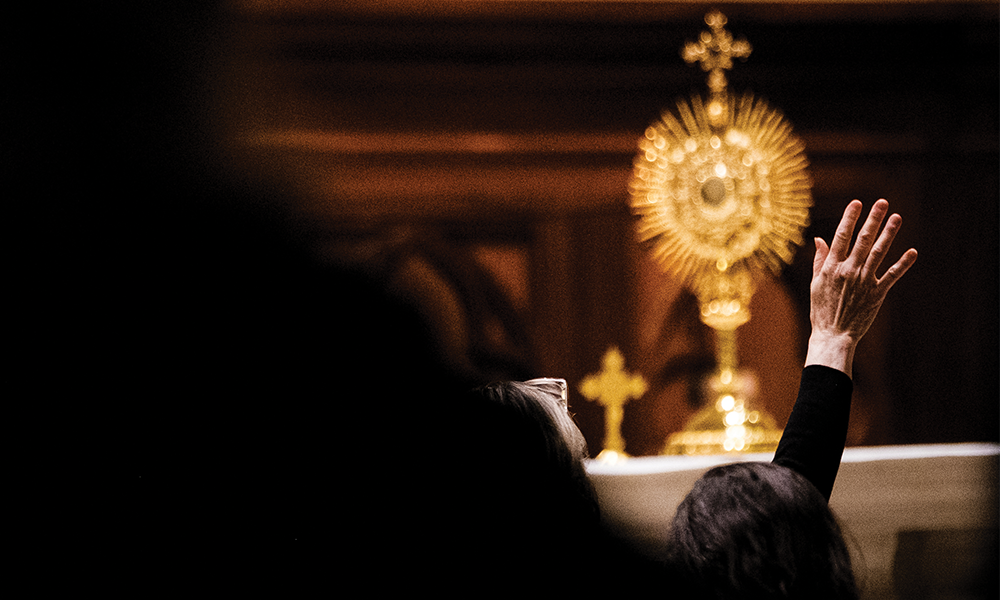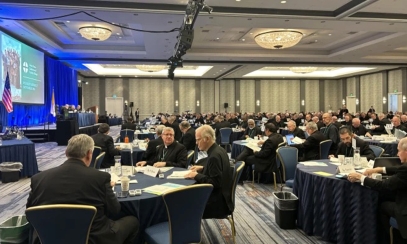
Healing is the mission of the Church
“Great crowds came to [Jesus], bringing the lame, the blind, the crippled, the mute and many others, and laid them at his feet; and he healed them.” Matt. 15:30
Nearly one-fifth of the Gospel accounts is devoted to Jesus’ healing ministry, including the circumstances, the methods used and the effects on the people whom he healed and those who witnessed it. This clearly speaks to healing as an important focus of his life and ministry.
After observing the healing ministry of Jesus firsthand, John the Evangelist writes: “Now Jesus did many other signs in the presence of his disciples that are not written in this book. But these are written that you may come to believe that Jesus is the Messiah, the Son of God, and that through this belief you may have life in his name.” (John 20:30-31)
Pope Francis, from the very beginning of his pontificate, spoke of the Church as a ‘field hospital.’ “This is the mission of the Church: the Church heals, it cures. Sometimes, I speak of the Church as if it were a field hospital. It’s true: there are many, many wounded! So many people need their wounds healed! This is the mission of the Church: to heal the wounds of the heart, to open doors, to free people, to say that God is good, God forgives all, God is the Father, God is affectionate, God always waits for us.” 1
If healing is the mission of the Church, it must be an important part of the ministry provided to those in need. If we look around us, we see that the world is hurting, the Church is hurting, people are hurting, families are hurting and people are losing hope. Only Jesus can heal this hurting world. And Jesus desires to heal his people. He desires that his healing ministry continue in the Church today.
In response to this desire, the Diocese of Saginaw began Evenings of Healing last May at the Cathedral in order to bring forward this particular mission of the Church. This ministry has continued over the past eight months. You will read more about it in this issue of Great Lakes Bay Catholic.
As a part of this healing ministry in the Diocese of Saginaw, people have the opportunity to experience the healing power and mercy of Jesus in many ways – physically, emotionally and spiritually. Jesus continues to heal his people. Just as during the time of Jesus, many people have experienced miraculous healings on these evenings. The power and mercy of Jesus has been incredible. Is Jesus not the Divine Physician?
I have been involved in the healing and deliverance ministry from very early on in my priesthood when a dear priest and mentor, now-deceased Monsignor Marvin Mottet, invited me to be a part of a healing team at Sacred Heart Cathedral in Davenport, Iowa. I, like many priests, knowing that I had little or no exposure, much less training in this area of ministry, approached it with great hesitancy. There was a monthly healing Mass at Sacred Heart Cathedral, and I recall driving back to Pella, Iowa (a three-hour drive) following the healing service on those nights tired, yet deeply inspired and exhilarated from being a part of and witnessing the healing power of Jesus. Those evenings laid the foundation for what would come later in my ministry – a more intense healing and deliverance ministry.
Not long after becoming a bishop, I became the episcopal moderator of the Pope Leo XIII Institute, an organization that provides the necessary formation for priests assigned in the ministry of deliverance and exorcism.
Throughout my priesthood, I have witnessed the healing love and mercy of Jesus Christ in my own life and in the lives of many others through this ministry. The healing Spirit of Jesus comes to us in the sacramental life of the Church, in particular the Sacraments of Anointing of the Sick, Penance and the Holy Eucharist. It also comes through Eucharistic adoration (an important part of our Evenings of Healing) as well as through the individual prayer by the healing prayer teams.
The many testimonies of healings experienced at our Friday Evenings of Healing give witness to what Jesus continues to do in the Church today, giving evidence that the Kingdom of God is in our midst. (Matt. 10:7-8)
As Pope Francis notes, “Mercy is the very foundation of the Church’s life. All of her pastoral activity should be caught up in the tenderness she makes present to believers; nothing in her preaching and in her witness to the world can be lacking in mercy. The Church’s very credibility is seen in how she shows merciful and compassionate love. The time has come for the Church to take up the joyful call to mercy once more. It is time to return to the basics and to bear the weaknesses and struggles of our brothers and sisters. Mercy is the force that reawakens us to new life and instills in us the courage to look to the future with hope.” 2
More than ever, I believe that the world is desperately in need of the Lord’s healing, even if it is one person at a time. Healing has always been an essential dimension of the apostolic mission of the Christian faith. I am grateful that some of our priests are seeking to bring healing ministry to their parishes so that Christ’s healing is made available to their own people in their part of the Diocese. If the Church is a “field hospital,” it is my hope and prayer that some type of healing ministry can become a normal part of ministry in every parish.
Because healing was central to the ministry of Jesus, the Church fulfills the mission proper to the Body of Christ, the mission that is a sharing in and, in a sense, a continuation of the mission of Christ himself.
1 Homily of Pope Francis, May 2, 2015
2 Pope Francis, Misericordiae Vultus, 10.
The Most Rev. Robert D. Gruss is the seventh bishop of the Catholic Diocese of Saginaw.



